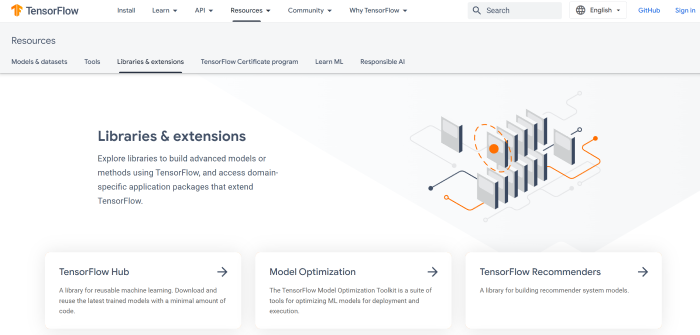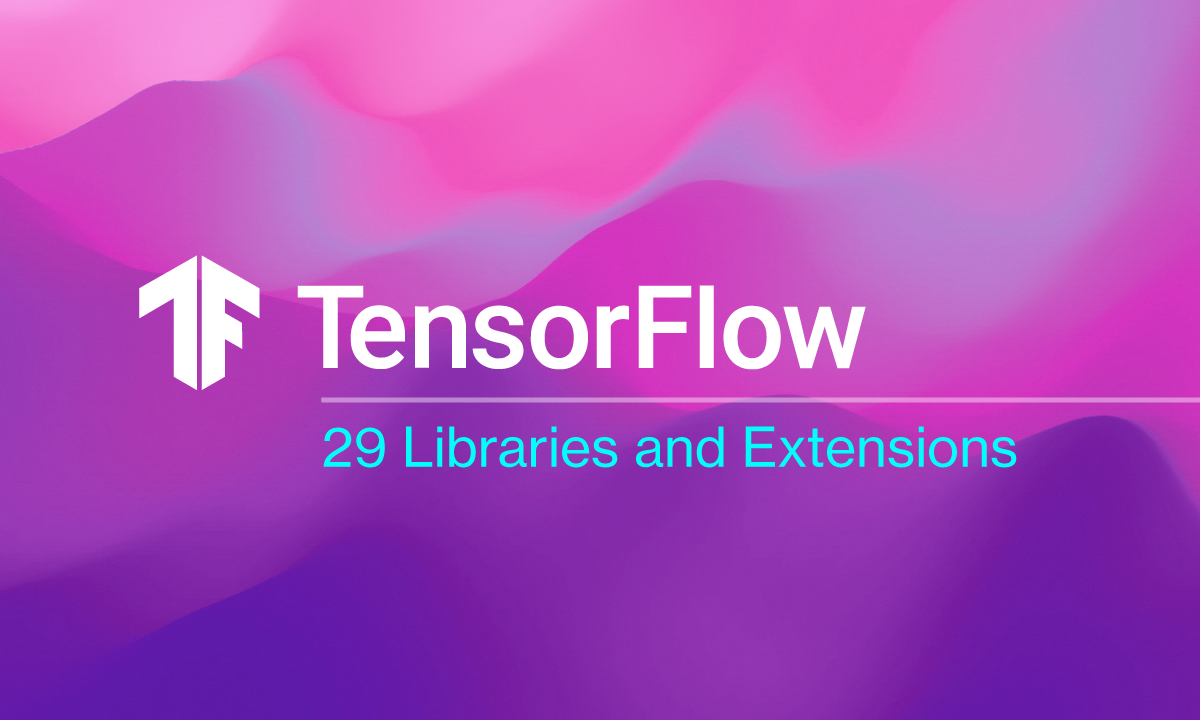Learn More About TensorFlow Libraries and Extensions
TensorFlow is an end-to-end open source platform for machine learning (ML). It has a comprehensive, flexible ecosystem of tools, libraries, and community resources that lets researchers drive innovation in the machine learning space, and developers to easily build and deploy ML-powered applications.
Although PyTorch has recently been gaining ground as a go-to framework for researchers, TensorFlow still retains its title for the time being. This has been helped in large part to TensorFlow originally being released nearly a full year before PyTorch.
TensorFlow was originally developed by researchers and engineers working on the Google Brain team within Google's Machine Intelligence Research organization to conduct machine learning and deep neural networks research. The system is general enough to be applicable in a wide variety of other domains, as well.
TensorFlow provides stable Python and C++ APIs, as well as non-guaranteed backward compatible API for other languages.
In this article we will give an overview of the TensorFlow ecosystem.

The following list of libraries and extensions make it even easier to build advanced models or methods using TensorFlow, and access domain-specific application packages that extend TensorFlow.
- TensorFlow Hub: A library for reusable machine learning. Download and reuse the latest trained models with a minimal amount of code.
- Model Optimization: The TensorFlow Model Optimization Toolkit is a suite of tools for optimizing ML models for deployment and execution.
- TensorFlow Recommenders: A library for building recommender system models.
- Lattice: A library for flexible, controlled and interpretable ML solutions with common-sense shape constraints.
- TensorFlow Graphics: A library of computer graphics functionalities ranging from cameras, lights, and materials to renderers.
- TensorFlow Federated: An open source framework for machine learning and other computations on decentralized data.
- Probability: TensorFlow Probability is a library for probabilistic reasoning and statistical analysis.
- Tensor2Tensor: Tensor2Tensor is a library of deep learning models and datasets designed to make deep learning more accessible and accelerate ML research.
- TensorFlow Privacy: A Python library that includes implementations of TensorFlow optimizers for training machine learning models with differential privacy.
- TensorFlow Agents: A library for reinforcement learning in TensorFlow.
- Dopamine: A research framework for fast prototyping of reinforcement learning algorithms.
- TRFL: TRFL (pronounced “truffle”) is a library for reinforcement learning building blocks created by DeepMind.
- Mesh TensorFlow: A language for distributed deep learning, capable of specifying a broad class of distributed tensor computations.
- RaggedTensors: Makes it easy to store and manipulate data with non-uniform shape, including text (words, sentences, characters), and batches of variable length.
- Unicode Ops: Supports working with Unicode text directly in TensorFlow.
- TensorFlow Ranking: TensorFlow Ranking is a library for Learning-to-Rank (LTR) techniques on the TensorFlow platform.
- Magenta: Magenta is a research project exploring the role of machine learning in the process of creating art and music.
- Nucleus: Nucleus is a library of Python and C++ code designed to make it easy to read, write and analyze data in common genomics file formats like SAM and VCF.
- Sonnet: A library from DeepMind for constructing neural networks.
- Neural Structured Learning: A learning framework to train neural networks by leveraging structured signals in addition to feature inputs.
- TensorFlow Addons: Extra functionality for TensorFlow, maintained by SIG Addons.
- TensorFlow I/O: Dataset, streaming, and file system extensions, maintained by SIG IO.
- TensorFlow Quantum: TensorFlow Quantum is a quantum machine learning library for rapid prototyping of hybrid quantum-classical ML models.
- Model Card Toolkit: Streamline and generate Model Cards—machine learning documents that provide context and transparency into a model's development and performance.
- Model Remediation: A library to help create and train models in a way that reduces or eliminates user harm resulting from underlying performance biases.
- Fairness Indicators: A library that enables easy computation of commonly-identified fairness metrics for binary and multiclass classifiers.
- Cloud: TensorFlow Cloud is a library to connect your local environment to Google Cloud.
- Decision Forests: State-of-the-art algorithms for training, serving and interpreting models that use decision forests for classification, regression and ranking.
- TensorFlow Text: A collection of text- and NLP-related classes and ops ready to use with TensorFlow 2.
These are all extremely useful libraries and extensions to help you focus on your the work you are trying to accomplish, rather than engineering a solution to try and get the results you want. The TensorFlow website is an essential resource for anyone working in machine learning, and you can click here to explore other useful resources including pre-trained models and datasets built by Google and the community.
Have any questions? Feel free to contact us about using TensorFlow with our Deep Learning, Machine Learning and AI systems.


